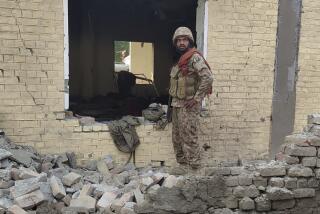7 killed in attack near Musharraf’s military office
- Share via
ISLAMABAD, PAKISTAN — A suicide bomber blew himself up Tuesday less than half a mile from President Pervez Musharraf’s office at army headquarters in the garrison city of Rawalpindi, killing seven other people.
The brazen attack, the latest in a series of suicide assaults aimed at Pakistan’s political leaders and military installations, came 11 days after a bomber killed about 140 people in the homecoming procession of former Prime Minister Benazir Bhutto in Karachi, the nation’s largest city.
There was no immediate claim of responsibility, but suspicion fell on Islamic militants, who have carried out dozens of such attacks in recent months.
The blast fueled tensions in Pakistan, which has been rocked by months of political instability and a rising Islamic insurgency.
The Pakistani Supreme Court is to rule this week on whether Musharraf’s election last month by lawmakers to another five-year presidential term is valid. If the decision goes against the Pakistani leader, many believe he will declare a state of emergency or even martial law.
Tuesday’s explosion was clearly heard in the Pakistani leader’s office, his aides said. As chief of the military as well as the nation’s political leader, Musharraf often works at army headquarters rather than the presidential compound in nearby Islamabad, the capital.
The bomber set off his explosives when he was stopped by police at an initial checkpoint near the headquarters, known as Army House. Several senior generals have residences near the blast site.
An Interior Ministry spokesman, Brig. Javed Iqbal Cheema, said the attacker was a 19- to 23-year-old man with long hair and a fair complexion.
It was not clear whether Musharraf, who has survived at least three assassination attempts, was the target of the attack.
Three police officers manning the checkpoint were among the dead; the others were civilian passersby, one of them an elderly man on a bicycle.
Nearly two dozen people were hurt, including at least two children traveling to school in a van. Pakistani television showed images of scattered school bags.
Musharraf spokesman Rashid Qureshi said the Pakistani leader would not be deterred from fighting militants or from an alliance with the United States against the Taliban and Al Qaeda.
Army installations have been a particular target of attacks since July, when security forces stormed Islamabad’s Lal Masjid, or Red Mosque, held then by Islamists.
On Sept. 4, 25 people were killed in a pair of explosions in a highly fortified military area in Rawalpindi.
Bhutto, who returned to Pakistan to lead her party in parliamentary elections to take place by mid-January, is to visit Rawalpindi next week.
Aides said she would go ahead with her plans despite Tuesday’s suicide attack, which she condemned.
Militants in Pakistan are growing ever bolder. A fugitive militant leader, Faqir Mohammed, held a rally Tuesday attended by thousands of armed supporters in the Bajur tribal region, near the Afghan border. Mohammed is thought to have close ties to Al Qaeda.
The rally was meant to commemorate the first anniversary of a missile attack on a madrasa, or religious seminary, in Bajur that killed about 80 people. The United States was widely blamed for the attack, which was aimed at militant leaders.
At the rally, Mohammed denounced Musharraf as a U.S. puppet.
Musharraf, who traveled later in the day to the restive North-West Frontier Province for a road-inauguration ceremony, vowed to halt “this deluge . . . this extremism and terrorism.”
The general, who has promised to relinquish his military role by mid-November if his election is upheld by the Supreme Court, is facing other legal challenges.
Chief Justice Iftikhar Mohammed Chaudhry, whom Musharraf tried to fire this year, setting off a pro-democracy groundswell, said Tuesday that a ruling would be made soon on a contempt-of-court case against senior members of Musharraf’s government. That is in connection with the deportation of former Prime Minister Nawaz Sharif, an opposition leader who tried in September to return from exile.
Sharif was put on a plane for Saudi Arabia without ever leaving Islamabad’s airport, despite an order from the high court that he be allowed to return unimpeded.
Spokesmen for Sharif’s party said they hoped he would be able to return to Pakistan sometime next month.
That could complicate matters for Bhutto and Musharraf, who are said to be close to a power-sharing accord. Sharif is a rival to both and an avowed opponent of such a deal.
--
Special correspondent Zaidi reported from Islamabad and Times staff writer King from Istanbul, Turkey.
More to Read
Sign up for Essential California
The most important California stories and recommendations in your inbox every morning.
You may occasionally receive promotional content from the Los Angeles Times.












